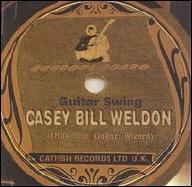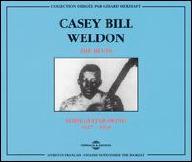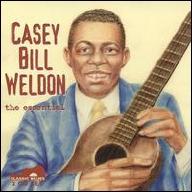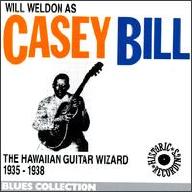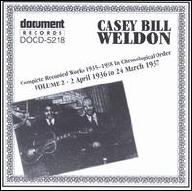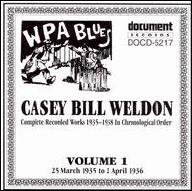Weldon recorded extensively under his own name during the years 1935-1938. Additionally, a thorough examination of his 11-year recording career reveals collaborations with Memphis Minnie, the Memphis Jug Band, Charlie Burse the Picaninny Jug Band, Vol Stevens, Ollie Rupert, Leroy Henderson, Arnett Nelson, Tampa Red, Big Bill Broonzy, Charlie Joe McCoy, Amos Easton (also known as Bumble Bee Slim); Blind Teddy Darby, the Hokum Boys, the Brown Bombers of Swing, Washboard Sam, and of course Peetie Wheatstraw, the Devil's Son-in-Law. Although no studio recordings seem to have been made after December 1938, Weldon is known to have performed using an electrically amplified guitar in 1941, and following a move to Los Angeles, he is known to have provided incidental music for film soundtracks. In 1968, guitarist Ted Bogan ran into him in Chicago. Weldon told him he had given up being a musician and was engaged in some other line of work in Detroit. Perhaps that is where he died. Nearly 60 years after they first appeared, Casey Bill Weldon's primary recordings were reissued in three volumes by the Document label, and various selections of his works have since been presented by Document's offshoot Classic Blues as well as the EPM, Catfish, and Fremeaux labels. It is unfortunate that Weldon does not appear on Proper's Steelin' It: The Steel Guitar Story, but then neither does the amazing Ceele Burke, who recorded with Louis Armstrong, Duke Ellington, and Fats Waller in the ‘30s. Nor does Luther Jones, whose Hawaiian-style steel guitar added luster to the provocative Grunt Meat Blues as recorded by the Memphis Seven in 1947 and reissued years later in Columbia's box set Roots n' Blues: The Retrospective 1925-1950, a multi-racial, multi-genre collection with a lengthy personnel listing which unfortunately does not include Casey Bill Weldon. ~ arwulf arwulf, Rovi
Casey Bill Weldon
from Pine Bluff, AR
July 10, 1909 - September 28, 1972 (age 63)
Biography
Steel guitarist Will Weldon is remembered as Casey Bill Weldon, and was also known in his time as Kansas City Bill and Levee Joe. "Casey", like "KC" or "Kaycee," referred to his links with the Kansas City music scene, although he could just as easily have been named after Pine Bluff, AK where he was born in 1909, or Atlanta or Memphis where he made his first recordings in 1927 after performing in medicine shows throughout the south. Inspired directly by the great Peetie Wheatstraw, Weldon was equally adept at expressing himself as a passionate blues singer and as a honky-tonk "country" performer who contributed to the development of Western swing. He was sometimes billed as the Hawaiian Guitar Wizard. The "Guitar Wizard" handle was borrowed from Tampa Red whereas the Polynesian reference stems back through Sol Hoopi's influence on the transportation of guitars by Portuguese sailors in the 18th century, and the subsequent development of the steel guitar by indigenous Hawaiians. Weldon's use of the steel (as opposed to bottleneck slide) guitar as a blues instrument was innovative, and his stylistic choices have since made him difficult to pigeonhole. Events leading to the dissolution of his short-lived marriage to Memphis Minnie may have inspired his three best-known tunes, which are staples in the classic blues repertoire: Somebody's Got to Go, Somebody Changed the Lock on My Door, and We Gonna Move to the Outskirts of Town.
Top Tracks
Albums
Videos
Close



